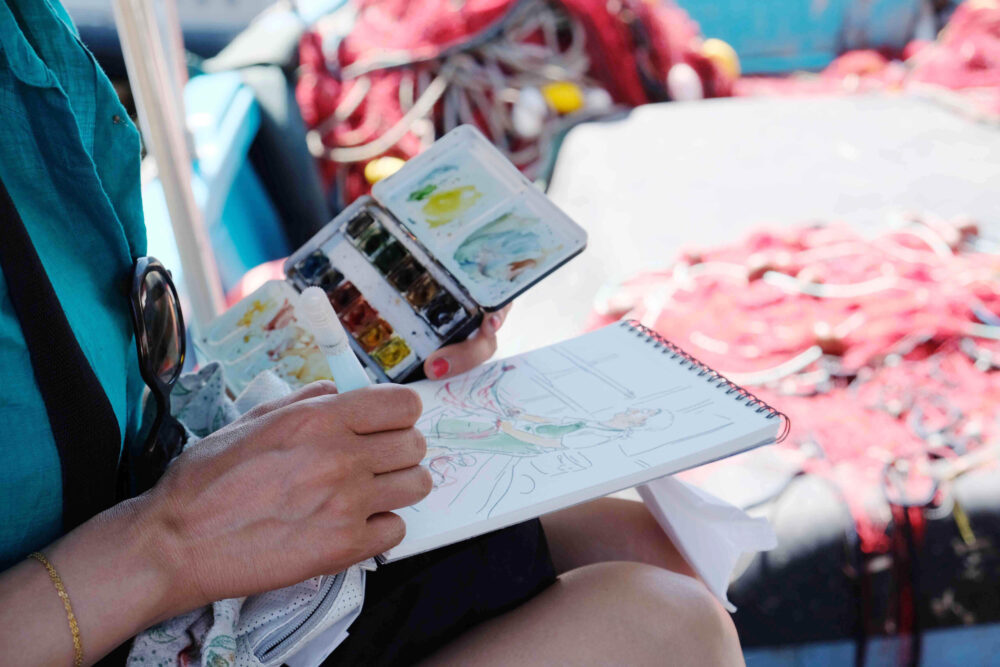
Waza on the Move, Ineffable arts of learning
23 october 2020
9:00 am to 2:30 pm – 4:00 pm to 8:30 pm
Scientific direction
Akira Takada (Kyoto University)
Xiaojie Tian (University of Tsukuba)
Masaki Shimada (Teikyo University of Science)
Frédéric Joulian (Centre Norbert Elias/EHESS)
Présentation
In Japan, under the term Waza (わざ) we mean the embodied know-how, the mastery of a craft act but also the processes and forms of tricks that go with it; it is loaded with profound meaning whose intensity is equivalent only to the pleasure experienced in performing or seeing performed an effective manual action. This word, the conceptions, practices and devices it implies will serve as a basis for questioning at new costs – closely mixing interaction and culture – the question of learning and transmission in both formalized and institutionalized universes and informal or performative ones. By calling on development psychology, primate ethology, hunter-gatherer anthropology, but also design, history, sociology or the sciences of education to contribute, we intend to take up again these central questions of Francophone
Programme
9:00 am – 4 pm
Welcome and introduction
Aude Fanlo (Head of Research & Teaching Dept. Mucem) and Annabel Vallard (Head of Techniques & Culture)
9:10 am
General introduction on the scientific issues of “Waza”
Akira Takada (Kyoto University), Xiaojie Tian (University of Tsukuba), Masaki Shimada (Teikyo University of Science) and Frédéric Joulian (Centre Norbert Elias/EHESS)
9:20 – 9:30
Presentation of the policy of the University of Seika and of the “Center for Innovation in Traditional Industries” with a special address to the WAZA question.
Oussouby Sacko (President of Seika University)
Session 1 (9:30 am – 4:30 pm). Waza, play & apprenticeship
Acquisition of skills to make and use tools through play and playfulness among wild chimpanzees
Masaki Shimada (Teikyo University of Science)
Anthropological imagination through drawing: Depicting playful childhood among the San of Southern Africa
Akira Takada (Kyoto University)
Playing House as an Ecosystem of Learning Environment Among Baka Children
Koji Sonoda (Japan Society for the Promotion of Science)
Learning to laugh: a Tanzanian case
Ines Pasqueron (Post Doc, Imaf AMU)
Discover New Affordances of Disability, Embodiment and Theatre making Through the Socially engaged Performance Theatre “I am a Normal Person”
I. Lien, Ho (Dept of Theatre Arts, National Sun Yat Sen Univ. Kaohsiung, Taiwan)
Manufactured Series – Choreographing a technical learning process
Inès Moreno (EHESS, Paris)
Gestural Interactions on the Intensive Training of Waza at a Puppet Theater
Haruka Okui (Dept of Social Studies, Doshisha University)
Session 2 (10:45 am – 5:45 pm). The Waza and the socialization of know-how
“Knowing by Feet” during the Growing-up of Pastoralist Maasai Children in Savanna
Xiaojie Tian (University of Tsukuba)
Waza and Women in Early Modern period of Japan
Junko Ohishi (Faculty of Health and Sport Sciences, Univ. of Tsukuba)
Waza in the Era of mechanized production
Yoann Moreau (Research Institute for Humanity and Nature, Kyoto)
Session 3 (11:30 am – 6:30 pm). The Waza, between tradition and innovation?
Textile routes and weaving communities (or praise of the loom)
Flavia Carraro (Centre Norbert Elias/Marseille)
From milpa culture to object design. A tradition of craftsmanship invented in the village of Tonahuixtla (Puebla-Mexico)
Francesca Cozzolino (ENSAD, Paris)
Correlation. Bamboo as an heuristic tool, the learning process of a technical gesture by a confrontation of two opposite materials
Fanny Pellegrin (ECAL, Lausanne)
Perceived “togetherness” and “MA” between two dancers in joint improvisation
Chia-Huei Tseng & al. (Tohoku University)
Knapping flint today
Gwendoline Torterat (Univ. Nanterre)
Session 4 (12:30 am – 7:30 pm). Between “body techniques” and objects, the role of skills
The Gàubi of Dali. Analysis of a complex technical action among Chimpanzee from Côte d’Ivoire
Frédéric Joulian (Centre Norbert Elias/EHESS)
On Waza’s Washi, the art of making Washi in Kurotani, Kyoto Mountains
Itsu Horigushi, F. Joulian, Kione Akao Kochi, Yuji Yonehara (Seika Univ./EHESS)
« Bringing the techniques to life »… or not. Practices on the yarn of Japanese horticulturists in a small district of the North of the conurbation of Ōsaka
Emilie Letouzey (Univ. Toulouse)
Rhythmical life: cases of cutting activities among the Baka people
Yujie Peng (National Museum of Ethnology, Japan)
World in a basket
Daniel Niles (Research Institute for Humanity and Nature, Kyoto)
Skin games.The incorporation of taxidermy know-how
Isabelle Borsus (Univ. Libre de Liège)
General comments
Gen Yamakoshi (Kyoto University) and Damien Kunik (Musée d’ethnographie de Genève, Switzerland) and conclusions by editors.
- Download full programme, with abstracts and bibliographical references.
—





